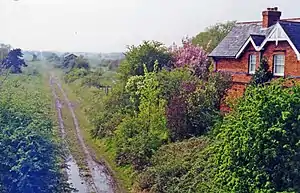Doddington and Harby | |
|---|---|
 Site of the station in 1995 | |
| General information | |
| Location | Nottinghamshire England |
| Coordinates | 53°13′58″N 0°40′59″W / 53.2327°N 0.6830°W |
| Grid reference | SK 881 714 |
| Platforms | 2 |
| Other information | |
| Status | Disused |
| History | |
| Original company | Lancashire, Derbyshire and East Coast Railway |
| Pre-grouping | Great Central Railway |
| Post-grouping | London and North Eastern Railway British Railways |
| Key dates | |
| March 1897 | Opened |
| 19 September 1955 | Closed to passengers[1] |
| March 1964 | Closed completely[2] |
Lancashire, Derbyshire & East Coast Railway | ||||||||||||||||||||||||||||||||||||||||||||||||||||||||||||||||||||||||||||||||||||||||||||||||||||||||||||||||||||||||||||||||||||||||||||||||||||||||||||||||||||||||||||||||||||||||||||||||||||||||||||||||||||||||||||||||||||||||||||||||||||||||||||||||||||||||||||||||||||||||||||||||||||||||||||||||||||||||||||||||||||||||||||||||||||||||||||||||||||||||||||||||||||||||||||||||||||||||||||||||||||||||||||||||||||||||||||||||||||||||||||||||||||||||||||||||||||||||||||
|---|---|---|---|---|---|---|---|---|---|---|---|---|---|---|---|---|---|---|---|---|---|---|---|---|---|---|---|---|---|---|---|---|---|---|---|---|---|---|---|---|---|---|---|---|---|---|---|---|---|---|---|---|---|---|---|---|---|---|---|---|---|---|---|---|---|---|---|---|---|---|---|---|---|---|---|---|---|---|---|---|---|---|---|---|---|---|---|---|---|---|---|---|---|---|---|---|---|---|---|---|---|---|---|---|---|---|---|---|---|---|---|---|---|---|---|---|---|---|---|---|---|---|---|---|---|---|---|---|---|---|---|---|---|---|---|---|---|---|---|---|---|---|---|---|---|---|---|---|---|---|---|---|---|---|---|---|---|---|---|---|---|---|---|---|---|---|---|---|---|---|---|---|---|---|---|---|---|---|---|---|---|---|---|---|---|---|---|---|---|---|---|---|---|---|---|---|---|---|---|---|---|---|---|---|---|---|---|---|---|---|---|---|---|---|---|---|---|---|---|---|---|---|---|---|---|---|---|---|---|---|---|---|---|---|---|---|---|---|---|---|---|---|---|---|---|---|---|---|---|---|---|---|---|---|---|---|---|---|---|---|---|---|---|---|---|---|---|---|---|---|---|---|---|---|---|---|---|---|---|---|---|---|---|---|---|---|---|---|---|---|---|---|---|---|---|---|---|---|---|---|---|---|---|---|---|---|---|---|---|---|---|---|---|---|---|---|---|---|---|---|---|---|---|---|---|---|---|---|---|---|---|---|---|---|---|---|---|---|---|---|---|---|---|---|---|---|---|---|---|---|---|---|---|---|---|---|---|---|---|---|---|---|---|---|---|---|---|---|---|---|---|---|---|---|---|---|---|---|---|---|---|---|---|---|---|---|---|---|---|---|---|---|---|---|---|---|---|---|---|---|---|---|---|---|---|---|---|---|---|---|---|---|---|---|---|---|---|---|---|---|---|---|---|---|---|---|---|---|---|---|---|---|---|---|---|---|---|---|---|---|---|---|---|---|---|---|---|---|---|---|---|---|---|---|---|---|---|---|---|---|---|---|---|---|---|---|---|---|---|---|---|---|---|---|---|---|
| ||||||||||||||||||||||||||||||||||||||||||||||||||||||||||||||||||||||||||||||||||||||||||||||||||||||||||||||||||||||||||||||||||||||||||||||||||||||||||||||||||||||||||||||||||||||||||||||||||||||||||||||||||||||||||||||||||||||||||||||||||||||||||||||||||||||||||||||||||||||||||||||||||||||||||||||||||||||||||||||||||||||||||||||||||||||||||||||||||||||||||||||||||||||||||||||||||||||||||||||||||||||||||||||||||||||||||||||||||||||||||||||||||||||||||||||||||||||||||||

Doddington and Harby railway station is a former railway station on the Nottinghamshire border with Lincolnshire, England.
Context
The station was opened in March 1897 by the Lancashire, Derbyshire and East Coast Railway on its main line from Chesterfield to Lincoln.[3]
The station served the rural villages of Doddington and Harby on either side of the county boundary.
It was closed to passengers by British Railways in 1955, although goods continued to be handled until 30 March 1964.
The stationmaster's house was built in the distinctive LD&ECR style, as can be seen in the accompanying photograph. The station buildings were also built in the company's style,[2][4] which had clear echoes at Arkwright Town, Bolsover South and Warsop, to name but three.
Former services
There never was a Sunday service at Doddington and Harby.
In 1922, three trains per day plied between Chesterfield Market Place and Lincoln, with a market day extra on Fridays between Langwith Junction and Lincoln. All these trains called at Doddington and Harby.[5]
From 1951 trains stopped running through to Chesterfield, turning back at Langwith Junction instead. Otherwise the same pattern continued until the last train on 19 September 1955.
Trains continued to pass, including summer excursions[6] which continued until 1964, but the picture was one of progressive decline. A derailment at Clifton-on-Trent on 21 February 1980[7] led to the immediate closure of the line from High Marnham Power Station through the station to Pyewipe Junction. These tracks were subsequently lifted.
Modern times
Today the trackbed eastwards from the site of Fledborough Station, across Fledborough Viaduct, through Clifton-on-Trent to Doddington and Harby forms an off-road part of National Cycle Route 647 which is part of the National Cycle Network.
From Doddington and Harby onwards through the site of Skellingthorpe almost to Pyewipe Junction the trackbed forms an off-road part of National Cycle Route 64.[8][9]
| Preceding station | Disused railways | Following station | ||
|---|---|---|---|---|
| Clifton-on-Trent Line and station closed |
Great Central Railway Lancashire, Derbyshire and East Coast Railway |
Skellingthorpe Line and station closed |
References
- ↑ Butt 1995, p. 80.
- 1 2 Croft 2000, p. 37.
- ↑ Cupit & Taylor 1984, p. 22.
- ↑ Booth 2013, p. 59.
- ↑ Bradshaw 1985, p. 718.
- ↑ Walker 1991, Inside front cover.
- ↑ Ludlam 2013, p. 144.
- ↑ Harby to Lincoln, Sustrans NR64 Sustrans
- ↑ Fledborough to Lincoln by Bike Cycle-route
Sources
- Booth, Chris (2013). The Lancashire, Derbyshire and East Coast Railway A pictorial view of the "Dukeries Route" and branches. Vol. Two: Langwith Junction to Lincoln, the Mansfield Railway and Mid Nott's Joint Line. Blurb. ISBN 978-1-78155-660-3. 06884827.
- Bradshaw, George (1985) [July 1922]. Bradshaw's General Railway and Steam Navigation guide for Great Britain and Ireland: A reprint of the July 1922 issue. Newton Abbot: David & Charles. ISBN 978-0-7153-8708-5. OCLC 12500436.
- Butt, R. V. J. (October 1995). The Directory of Railway Stations: details every public and private passenger station, halt, platform and stopping place, past and present (1st ed.). Sparkford: Patrick Stephens Ltd. ISBN 978-1-85260-508-7. OCLC 60251199. OL 11956311M.
- Croft, Eric (2000) [1993]. Lincolnshire Railway Stations on old picture postcards. Keyworth: Reflections of a Bygone Age. ISBN 978-0-946245-77-2.
- Cupit, J.; Taylor, W. (1984) [1966]. The Lancashire, Derbyshire & East Coast Railway. Oakwood Library of Railway History (2nd ed.). Headington: Oakwood Press. ISBN 978-0-85361-302-2. OL19.
- Ludlam, A.J. (March 2013). Kennedy, Rex (ed.). "The Lancashire, Derbyshire & East Coast Railway". Steam Days. Bournemouth: Redgauntlet 1993 Publications. 283. ISSN 0269-0020.
- Walker, Colin (1991). Eastern Region Steam Twilight, Part 2, North of Grantham. Llangollen: Pendyke Publications. ISBN 978-0-904318-14-2.
Further reading
- Dow, George (1965). Great Central, Volume Three: Fay Sets the Pace, 1900–1922. Shepperton: Ian Allan. ISBN 978-0-7110-0263-0. OCLC 500447049.